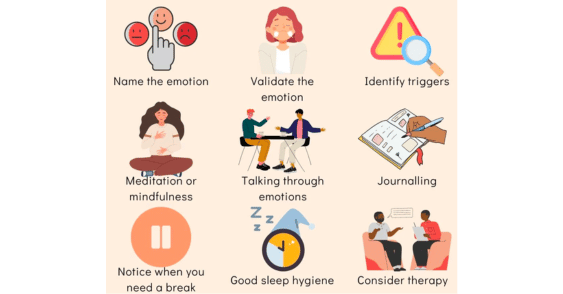An important part of being human is feeling emotions, which affect how we think, act, and enjoy life in general. How we manage our emotions affects our mental health, our relationships, and how we go about our daily lives. Emotional management doesn’t mean hiding your feelings; it means understanding them and reacting to them in a way that makes you feel good. We will talk about why it’s important to manage your emotions and some useful ways to do that.
1. Understanding Emotions:
Emotions are multifaceted, diverse, and completely unique to each and every person. It is possible for them to range from happiness and enthusiasm to melancholy, rage, and terror. The ability to recognize and correctly label one’s emotions is essential to emotional comprehension. Self-awareness is the cornerstone of effective emotional control, and it is essential to building it.
Reference: “Emotional Intelligence” by Daniel Goleman. Read full PDF
2. The Mind-Body Connection:
Emotions have a significant influence on the relationship between the mind and the body. Anger, worry, and stress that are not properly managed can all contribute to physical illnesses. Developing the ability to control one’s feelings has a beneficial impact on one’s general health, as it lowers the likelihood of developing chronic diseases and increases one’s sense of well-being.
Reference: “Why Zebras Don’t Get Ulcers” by Robert M. Sapolsky
3. Enhancing Mental Health:
One of the most important aspects of mental health is the capacity to properly control one’s responses to various emotions. It is possible that unresolved emotions are a factor that contributes to the development of mental health conditions such as anxiety and depression. The cultivation of mental resilience and the facilitation of the navigation of life’s problems can be accomplished through the development of coping skills and the solicitation of help when it is required.
Reference: “The Upward Spiral” by Alex Korb
4. Building healthy relationships:
Concerning the dynamics of interpersonal relationships, feelings are an important factor to consider. Emotional management that is effective will directly result in relationships that are healthier and more enjoyable for all parties involved. Understanding one’s own feelings and having the ability to exercise control over them are the cornerstones upon which effective communication, empathy, and the determination to resolve conflicts are constructed.
Reference: “The Seven Principles for Making Marriage Work” by John Gottman
5. Improving Decision-Making:
An individual’s emotional state may have an effect on the decision-making processes that they engage in. Emotional management makes it possible to make better selections by reducing the number of impulsive reactions and increasing the number of choices that are thoughtful and rational. This opens the door to improved decision-making choices. This holds the ultimate significance in both one’s personal life and one’s professional life environments.
Reference: “Thinking, Fast and Slow” by Daniel Kahneman
6. Coping with Change and Uncertainty:
There is a great deal of both progress and uncertainty in the world that we are now living in. It is possible for individuals to develop the resilience that is required to successfully manage changes, adapt to new circumstances, and deal with obstacles that were not anticipated if they learn to control their sentiments and their emotions.
Reference: “Option B: Facing Adversity, Building Resilience, and Finding Joy” by Sheryl Sandberg and Adam Grant
7. Stress Reduction Techniques:
One of the most important aspects of emotional management is the implementation of techniques that provide relief from stress. Mindfulness, meditation, and deep breathing are only some of the approaches that can be utilized to accomplish emotional regulation, stress reduction, and the creation of a sense of calm. Other techniques that can be utilized include deep breathing.
Reference: “Full Catastrophe Living” by Jon Kabat-Zinn
8. Expressing Emotions Creatively:
By engaging in creative activities, one can effectively express and process their emotions in a manner that is beneficial to their well-being. It is possible to find a channel for creative expression by participating in hobbies such as writing, music, or art. These activities can serve as a form of self-expression and emotional release.
Reference: “The Artist’s Way” by Julia Cameron
9. Seeking Professional Support:
In situations where one is coping with more complicated mental issues, it is very vital to seek the guidance of a mentally trained specialist. Counselors and therapists are able to provide patients with direction, resources, and a secure setting during the course of therapy sessions. This allows patients to correctly explore and control their feelings in a manner that is appropriate for them.
Reference: “Maybe You Should Talk to Someone” by Lori Gottlieb
10. Cultivating Positive Habits:
Similar to caring for a healthy garden, improving our emotional well-being requires the deliberate cultivation of beneficial activities that nourish our mental and emotional health. Consistent exercise is crucial. Fitness is a mental elixir as well as a physical one. Regular exercise releases endorphins, nature’s antidepressants, which improve mood. Our neurons dance joyfully, generating an uplifting symphony that resonates across our emotional landscape.
Also important is a nutritious diet, not as a restricted regimen but as a vivid palette of nutrition that fuels the body and mind. The nutrients we eat affect our brain chemistry. Including fruits, veggies, nutritious grains, and lean proteins is like giving our brain the best art supplies. Antioxidant and omega-3-rich diets boost mood and clarity. It’s like feeding our emotional guards and giving them the resources they need to establish harmony.
A good night’s sleep is an underrated positive behavior hero. Quality sleep resets our emotions. Imagine nightly trips to an oasis where minds relax, emotions balance, and stress melts into dreams. When we sleep sufficiently, we wake up physically and emotionally ready for the day. It builds a strong emotional foundation that withstands life’s storms silently.
These good activities constitute a triad that affects mood and emotional well-being. Instead of strict regulations, we could take them as gentle promises to our happiness. It needs frequent care, like a garden. Exercise, a healthy diet, and enough sleep generate a pleasing melody in our emotional symphony. We become active players in our emotional well-being’s lively dance when we adopt these good activities.
Reference: “The Power of Habit” by Charles Duhigg
Regulating Emotions

Takeaway
Life is full of changes, difficulties, and unknowns all the time. Keeping our feelings in check gives us the strength to get through these storms. It’s not about holding back your feelings; it’s about finding healthy ways to talk about and deal with them. We use ways to deal with stress, creative outlets, and good habits to get through the mental ups and downs. Getting professional help is important sometimes, like having a trusted guide through the maze of our feelings.
Basically, controlling our feelings is an art form, a skill that can change the way we live our lives. We should enjoy the music of our feelings, know their beats, and dance with them instead of letting them throw us around. Feeling strong emotions? Think of them as a friendly tap on the shoulder from your inner self, telling you to pay attention, understand, and answer with kindness. Taking care of your feelings is the tune that makes everything fit together in the complicated dance of life.


[…] read: Do You Know How To Manage Your Emotions And Why It […]
I do consider all the ideas you’ve presented on your post.
They are very convincing and will certainly work. Nonetheless,
the posts are very brief for starters. Could you please extend them
a bit from subsequent time? Thank you for the post.
Hello colleagues, how is the whole thing, and what you wish for to say regarding this article, in my view its genuinely awesome for me.